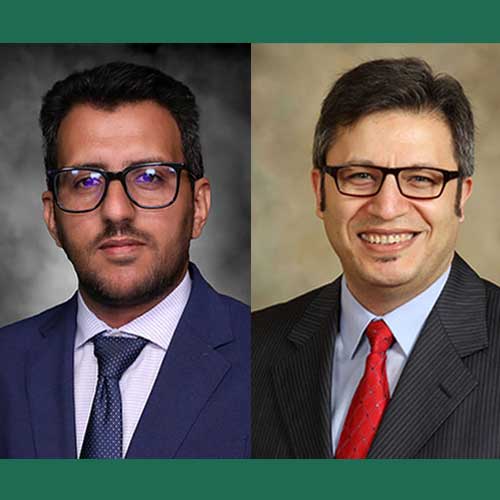 A team of UAB investigators led by Dr. Abdulaziz Ahmed, Associate Professor of Health Services Administration (HSA), has been awarded $1M through an NIH R21/33 AHRQ grant to develop an artificial intelligence (AI)-based decision support system to help emergency department (ED) management to manage ED resources proactively and consequently mitigate ED overcrowding. The system, which Dr. Ahmed will develop in collaboration with Drs. Bunyamin Ozaydin (MPI) and Eta Berner (Co-I) from the HSA department and James Booth, MD, from the UAB Health System ED, predicts different ED measures of ED traffic, such as the number of ED admitted patients, to anticipate ED crowding. These predictions can be used to allocate ED resources earlier in a surge to avoid overcrowding. These prediction models will be enclosed in a decision support system that will be used by ED management personnel.
A team of UAB investigators led by Dr. Abdulaziz Ahmed, Associate Professor of Health Services Administration (HSA), has been awarded $1M through an NIH R21/33 AHRQ grant to develop an artificial intelligence (AI)-based decision support system to help emergency department (ED) management to manage ED resources proactively and consequently mitigate ED overcrowding. The system, which Dr. Ahmed will develop in collaboration with Drs. Bunyamin Ozaydin (MPI) and Eta Berner (Co-I) from the HSA department and James Booth, MD, from the UAB Health System ED, predicts different ED measures of ED traffic, such as the number of ED admitted patients, to anticipate ED crowding. These predictions can be used to allocate ED resources earlier in a surge to avoid overcrowding. These prediction models will be enclosed in a decision support system that will be used by ED management personnel.
When Dr. Ahmed started at UAB two years ago, he was deeply impressed by the strength of the existing UAB hospital system and by UAB’s rich collaborative environment—tools he could work with in his quest to solve healthcare problems using AI and decision support tools. He is passionate about leveraging existing resources and utilizing them to their fullest capacity by improving their efficiency.
As he prepared to submit his funding application, Dr. Ahmed worked with the SHP Office of Research and Innovation (SHP-R&I). SHP-R&I conducts grant development workshops and offers both group and one-on-one sessions to researchers who are developing grant applications. Dr. Ahmed mentioned that the specialized training he received at SHP-R&I, and the collaborative atmosphere created by SHP-R&I’s REACH cohort model (in which fellow grant-seeking scholars from the school's five departments worked together to develop their funding applications), enhanced his grant-writing skills: "The collective impact of these activities substantially benefitted the refinement of my writing for the resubmission of this proposal and will be advantageous for any proposals I plan to submit in the future." He explained further: “Before joining UAB, I had limited grant writing experience. However, going through the specific aims page writing workshop and working closely with grant editors that Dr. Aneja connected me with has been crucial in making this proposal competitive. I also want to thank Patrick & Brooke, who have been very helpful with administrative support for grant submission and managing the award, making all the processes smooth and seamless. They saved me a lot of time as a new investigator getting my first grant.”
Dr. Ahmed also spoke highly of the research mentoring he received at SHP: “Dr. Eta Berner and Dr. Ritu Aneja are great mentors. Having an experienced mentor like Eta in my department has been fantastic to brainstorm my ideas. Ritu being the associate dean for research and innovation – she is very approachable, and I can ask her any questions about research and grant writing. There is a lot of support to do research and be successful at SHP. I’m very happy to be here in this research environment and feel very supported to make more significant impact”.
To continue to develop his grantsmanship, Dr. Ahmed was nominated to the Grant wRiting InTensive (GRIT) program conducted by the UAB Office of Research Development and COERE. Dr. Ahmed said, “the GRIT program is going very well. I’m working on another grant proposal idea and getting a lot of good feedback through the GRIT coaching and mentoring resources in addition to the editorial support I can access through REACH”.
The grant awarded to Dr. Ahmed and the rest of the collaborative team of HSA and ED faculty will address a strategic priority of the UAB health system : to increase capacity and improve access to care, especially in overcrowded units such as the Emergency Department, intensive care units, and operating rooms. To that end, SHP-R&I will continue to actively foster collaborations like the one reported here, bringing together faculty and systems in SHP and other UAB schools to garner funding for impactful research at UAB.